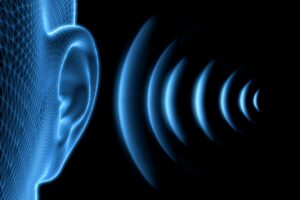Struggling with hearing? Request a hearing test appointment today.
Tinnitus can be annoying, repetitive, and, over time, distressing. It is characterised by a buzzing or ringing sound in one or both ears that doesn’t go away. But is there a test for tinnitus? Yes, audiologists use a range of tests to help determine the pitch, frequency and severity of tinnitus.
While there are thousands of potential causes of tinnitus, the symptoms are normally similar, with varying degrees of severity. The first step to implementing the right treatment and therapies to relieve tinnitus, cure it altogether, or at the very least reduce the impact of the sound is to get a formal, full diagnosis from an audiology professional.
So how do we test for tinnitus? We use a wide range of simple, gentle, and pain-free tinnitus testing techniques to determine whether you are suffering from tinnitus and to identify the underlying cause. In this article, we’ll discuss some of the tests we recommend most often, how they work, and what to expect.
How to test for tinnitus: 7 Options
1. Audiology Assessments – The Tinnitus Handicap Inventory
The Tinnitus Handicap Inventory, or THI, is a consultative approach in which one of our skilled audiologists will ask you a series of questions about your hearing and how tinnitus symptoms and other reduced hearing are affecting your life.
THI is recognised around the world as a scoring system. It provides us with the data we need to grade your tinnitus, identifying how serious the symptoms.
Your audiologist will also ask about your medical history and lifestyle since some factors might contribute to your tinnitus or help us tailor the treatments we suggest. For instance, if you have suffered an injury that has impacted your ear, have several family members with tinnitus, are regularly exposed to loud, persistent noise through work, or are taking certain medications, these may be relevant.
Related Reading: All you need to know about Tinnitus caused by loud noise
2. Physical Ear Examinations and Testing
Once we have a full background, we’ll normally perform some evaluations and assessments, looking inside your ear and checking things like pressure, speech mapping and looking at the ear canal itself. Blockages caused by excessive ear wax, for example, might be making your tinnitus much worse and can be quickly remedied.
While tinnitus is not always linked to hearing loss, it often can be, so a series of hearing tests ensures your audiologist knows whether there are any issues within your middle ear, inner ear and auditory canal that need to be treated or managed.
3. Pure Tone Audiology Tests
Tone assessments check how you hear sounds at high and low frequencies. You’ll listen to varied noises played through a headset, beginning at a low volume. The audiologist will normally ask you to either repeat the words you can hear or raise your hand if you can or cannot hear anything.
This type of hearing test is highly reliable and helps to differentiate between signs of hearing loss and tinnitus itself.
4. Tinnitus Matching Evaluations
Another similar test using different pitches and frequencies is called tinnitus matching. In short, this assessment aims to match the noise you are hearing, often represented by a ringing or buzzing noise.
By determining what your tinnitus sounds like and how it is affecting your everyday routines, your audiologist can better grasp the intensity of the noise and adjust their care planning accordingly to try to ‘cancel out’ the noise or lessen the effect.
5. Speech Mapping Tests
Once your hearing tests are complete, your audiologist might wish to run a speech mapping assessment, which is another useful way to work out how your tinnitus is affecting your hearing. Like frequency-based assessments, you’ll listen to a series of words, with and without a hearing aid, if you already use hearing aids.
This appraisal is important because it ensures your audiologist knows how your hearing is performing now and at which frequencies it begins to taper off – which might affect the type of hearing aid and programming we advise.
6. Video Otoscopy Assessments
A video otoscopy is painless and involves inserting a tiny camera. The camera produces a real-time video feed showing what is happening inside the eardrum and ear canal. Many clients find the video fascinating and can see any blockages or obstructions causing their tinnitus.
In some cases, tinnitus is attributed to an infection or other underlying health condition, so a video otoscopy rules out any of these causes or shows the audiologist why your hearing is being affected.
Oxford University created an educational video of an otoscopy ear examination, which may be a useful resource if you are concerned about the test or would like to see how this works.
Related Reading: The different types of hearing tests explained
7. Tympanometry Testing
Also known as ear pressure testing, tympanometry is a way to examine the inner ear and determine any issues, such as a perforated or damaged eardrum, an infection, or excess fluid build-up. These symptoms are fairly easy to resolve in most clients, but they can cause pain, discomfort, and tinnitus symptoms.
Some people find that tinnitus is a side effect of being exposed to high pressure through their profession, such as when travelling by plane regularly or diving. During the test, the audiologist will place a small device into each ear, which pushes air gently inside.
The tympanogram then measures the movement of your eardrum at varying pressures and can identify problems with the functionality of your inner ear.
 A note from our audiologist
A note from our audiologist
“Through a detailed evaluation, including audiometric tests and imaging, we can tailor a management plan. Recognising the nuances of tinnitus is essential for effective treatment and improving patient outcomes – and that starts with a thorough examination.”
Lee Fletcher. (RHAD), (BSHAA), Ba(Hons)
Why Are There So Many Tests for Tinnitus?
Tinnitus is a complex condition, and it is essential that your audiologist knows why you are experiencing distracting noises or what is causing or worsening your tinnitus. By performing a variety of tests, we can identify any underlying causes and see exactly what is happening inside your ear.
Tailoring hearing tests to the person ensures we develop a customised treatment plan that will provide the best possible relief – be that a sound cancellation device, an advanced hearing aid, or therapy to reduce the effect of tinnitus.
For more information about tinnitus testing or to book a full hearing assessment at your nearest Regain Hearing clinic, please contact us or reserve your appointment through our online booking system.


 A note from our audiologist
A note from our audiologist